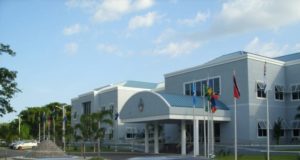KINGSTON, Jamaica, Nov. 30, 2016 – The Intergovernmental Panel on Climate Change (IPCC), the international body for assessing the science related to climate change, isembarking on its first-ever Caribbean visit this week with a two-day outreach event here.
In welcoming participants at Wednesday’s opening ceremony at the University of the West Indies, Regional Headquarters Building, Pro Vice Chancellor, Professor Dale Webber noted that climate change will be a pillar of the university’s research as it embarks on its new strategic plan for 2017-2022.
“From Bermuda to the north, Trinidad and Tobago to the south, Barbados to the east and Belize to the west, all these countries have something in common, and that is climate change. It touches us all and we all must be concerned,” Webber said. “Research and development and innovation are the rudimentary principles of sustained economic growth and the University of the West Indies must play a lead role in the discourse on strategies and a sustainable development path for the region.
“As we come to the end of what is our current strategic plan where there were 15 research items of priority, I’m pleased to note that nine of these are already under research priorities within the University of the West Indies – agriculture and food security, governance and management of the Caribbean Sea, health and wellness, natural hazard management, renewable energy, sustainable tourism, education and climate change,” he said.
Webber noted that while the debate on climate change is now over, “We cannot stop the climate-change impacts right now because we’ve inherited that from our predecessors. We do, however, owe it to our children and their children to do what we can to reduce and reverse it, if possible.”
The IPCC was set up in 1988 by the World Meteorological Organization (WMO) and United Nations Environment Program (UNEP) to provide policymakers with regular assessments of the scientific basis of climate change, its impacts and future risks, and options for adaptation and mitigation.
Read more here



